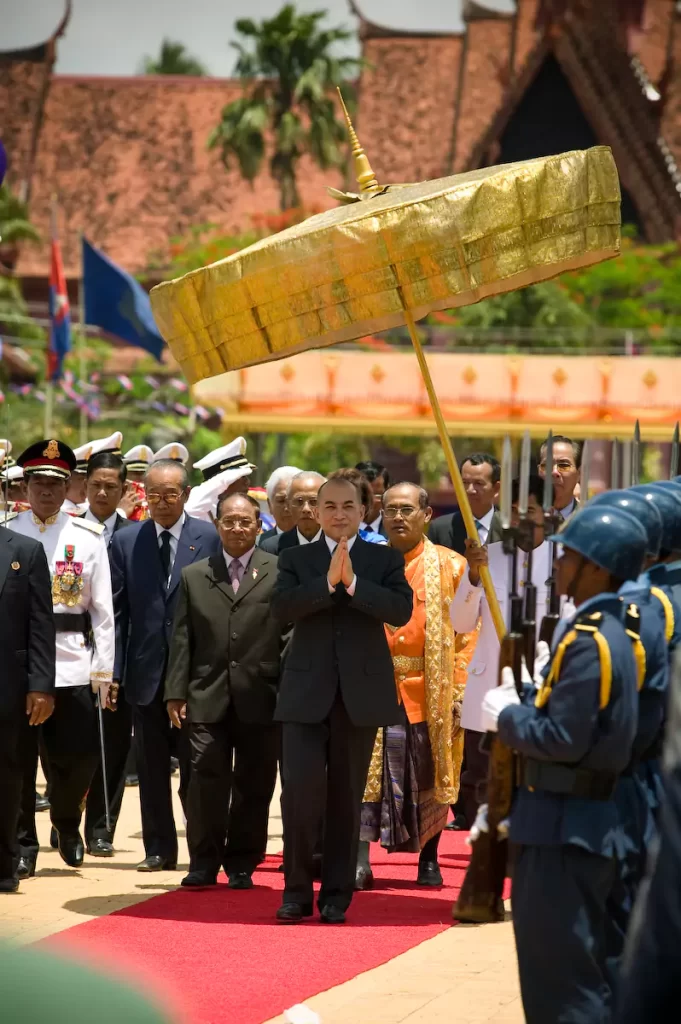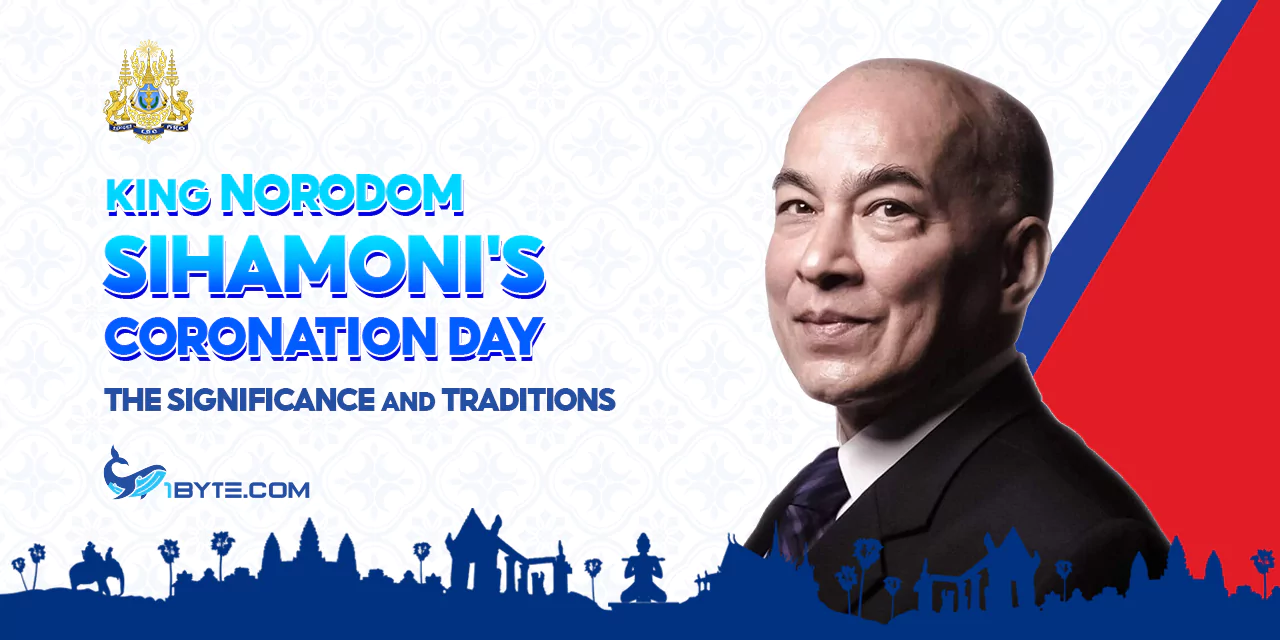King Norodom Sihamoni’s Coronation Day is a significant event in Cambodia, celebrated annually on October 29th. This day marks the ascension of King Norodom Sihamoni to the throne in 2004, following his father’s abdication. The coronation ceremony is steeped in tradition and symbolism, reflecting Cambodia’s rich cultural heritage.
The day is filled with various activities, including religious ceremonies, cultural performances, and public celebrations. It’s a time for Cambodians to come together and honor their king, reflecting on his contributions to the nation. The event also attracts tourists, boosting local businesses and promoting cultural exchange.
Read on this article from 1Byte for further information on this special day.
Historical Context
October 29th, dubbed King Norodom Sihamoni’s Coronation Day, is one that is celebrated annually in Cambodian history. King Sihamoni, since his coronation in 2004, has been a huge driving peace and cultural heritage in Cambodia. His reign began King Norodom Sihanouk abdicated the throne. It’s the coronation ceremony, steeped in tradition, which symbolises the continuity of the monarchy and divine blessing of a king.
King Norodom Sihamoni Coronation Day is not only an internal affair of Cambodia. It draws attention to the country’s abundance of cultural heritage and love of traditional royal customs. The event reminds that the royal family had played a role in boosting national unity and stability. The Ministry of Foreign Affairs and International Cooperation provides further details.
King Norodom Sihamoni’s Coronation Day goes beyond being a public holiday: it’s a celebration to honor the monarchy and its role in the nation’s identity. Various cultural events and ceremonies are observed on the day which celebrates the king and his legacy. It’s a celebration of how the Cambodian monarchy has still withstood the test of time.
Date and location of King Sihamoni’s coronation
King Norodom Sihamoni was crowned on October 29, 2004. The coronation took place at the Royal Palace in Phnom Penh, Cambodia. This event marked the beginning of his reign after his father, King Norodom Sihanouk, abdicated the throne.
King Sihamoni’s coronation was a significant moment in Cambodian history. It symbolized the continuity of the monarchy and the hope for a stable and prosperous future for Cambodia. The ceremony was attended by dignitaries from around the world, highlighting the importance of the event on a global scale.
Modern Day Relevance of King Norodom Sihamoni’s Coronation Day

King Norodom Sihamoni’s Coronation Day continues to hold significant cultural and historical importance in Cambodia. Celebrated annually on October 29th, this day marks the ascension of King Norodom Sihamoni to the throne in 2004. The event is not just a historical commemoration but also a vibrant celebration of Cambodian heritage and unity.
The celebration Cambodians around the country, boosting local tourism and economy. The Royal Palace in Phnom Penh becomes a focal point for various cultural performances, traditional ceremonies, and public gatherings. This influx of visitors contributes significantly to the local economy, with hotels and businesses reporting increased bookings and sales during the festivities.
Moreover, King Norodom Sihamoni’s reign has been marked by efforts to promote cultural heritage and international relations. His coronation symbolizes the continuity of the monarchy and its role in fostering national identity and pride. The King’s active involvement in cultural and philanthropic activities has further strengthened his relevance in modern-day Cambodia.
Leverage 1Byte’s strong cloud computing expertise to boost your business in a big way
1Byte provides complete domain registration services that include dedicated support staff, educated customer care, reasonable costs, as well as a domain price search tool.
Elevate your online security with 1Byte's SSL Service. Unparalleled protection, seamless integration, and peace of mind for your digital journey.
No matter the cloud server package you pick, you can rely on 1Byte for dependability, privacy, security, and a stress-free experience that is essential for successful businesses.
Choosing us as your shared hosting provider allows you to get excellent value for your money while enjoying the same level of quality and functionality as more expensive options.
Through highly flexible programs, 1Byte's cutting-edge cloud hosting gives great solutions to small and medium-sized businesses faster, more securely, and at reduced costs.
Stay ahead of the competition with 1Byte's innovative WordPress hosting services. Our feature-rich plans and unmatched reliability ensure your website stands out and delivers an unforgettable user experience.
As an official AWS Partner, one of our primary responsibilities is to assist businesses in modernizing their operations and make the most of their journeys to the cloud with AWS.
Influence on contemporary Cambodian society
King Norodom Sihamoni’s Coronation Day has a profound impact on contemporary Cambodian society. Celebrated annually on October 29th, this day not only honors the king but also reinforces national unity and cultural pride.
- Cultural Preservation: The celebration of King Norodom Sihamoni’s Coronation Day plays a crucial role in preserving Cambodian culture. Traditional dances, music, and rituals are performed, ensuring that these cultural practices are passed down to future generations. This helps maintain a strong sense of identity and continuity within the community.
- National Unity: The event brings together people from all walks of life, fostering a sense of national unity. It serves as a reminder of the country’s rich history and the importance of working together for a common future. This unity is essential for the country’s development and progress.
- Economic Impact: The festivities surrounding King Norodom Sihamoni’s Coronation Day also have a positive economic impact. The influx of tourists and the increased demand for local products and services boost the economy. Small businesses, in particular, benefit from the heightened activity during this period.
- Educational Initiatives: The king’s commitment to education is highlighted during the celebrations. Various educational programs and scholarships are announced, aiming to improve access to education for all Cambodians. This focus on education is vital for the country’s long-term development and prosperity.
- Healthcare Improvements: King Norodom Sihamoni’s Coronation Day also emphasizes the importance of healthcare. The king’s philanthropic efforts have led to the establishment of several healthcare initiatives, improving the overall well-being of the population. These initiatives are celebrated and promoted during the festivities, raising awareness about the importance of health and wellness.
In summary, King Norodom Sihamoni’s Coronation Day significantly influences contemporary Cambodian society by promoting cultural preservation, national unity, economic growth, educational initiatives, and healthcare improvements. This annual celebration serves as a reminder of the king’s dedication to his people and the country’s rich heritage.

